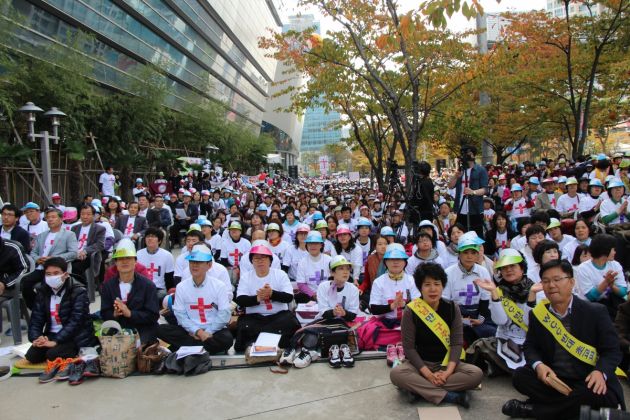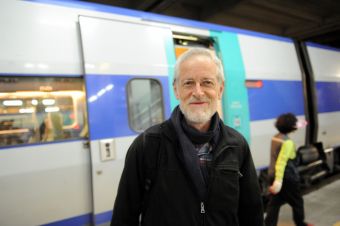Korean Christians rail against world church body, Peace Train arrives

BUSAN, South Korea - One of the current aims of many global ecumenical organizations is to make contacts with people of other faiths.
In an age when much of the warring going on in parts of the world, especially the Middle East and parts of Africa is done in the name Islam - a distortion say most followers of the Prophet Muhammad - the building of bridges between Christians and Muslims is seen as essential or all of humanity.
The general secretary of the World Council of Churches, Rev. Olav Fykse Tveit is trying to get leaders of all the main faiths living in Syria to come to come together when the political leaders are hoped to meet in Geneva later in November.

Such type of contact has clearly angered some Christians in Korea who protested vociferously in Busan Tuesday against the coming Assembly of the World Council of Churches that was to start the following day.
Around 5,000 people are expected to take part in the gathering of the WCC that represents some 560 million Christians from mainly Anglican, Orthodox and traditional Protestant churches, but that also has Evangelical and Pentecostal churches as members.
But more than 1,000 protestors shouting "down with the WCC" singing hymns and praying Tuesday held a protest against the once-every seven-years Assembly that was to start the following day on October 30 in Busan, South Korea.
The group is made up of 71 churches in South Korea showed that Koreans are passionate about their Christianity even if they don't all agree with the paths the churches are taking.
One steward at the protest told Ecumenical News the WCC is "tainted by pluralism" by embracing different gods, communism, homosexuality and other lifestyles.
Speakers said that these are condemned in the Bible.
"Religious pluralism is heresy, denying the authority of the Bible, and is an Antichrist scheme aimed at rooting out Christianity," Song Chun-gil, a representative of the group told the Korea Herald newspaper on October 24.
Part of the WCC's inclusiveness is to act as a peace broker for the nation that has remained divided in North and South since inconclusive end of the Korean War in 1953.
On the evening of October 28, a Peace Train that left Berlin 22 days earlier arrived at its destination in Busan.
The train made its way through eastern Germany and across the plains of Poland to Moscow and through China to Korea on its mission of reconciliation and reunification of the divided Koreas.
KOREAN ORGANIZING COMMITTEE
Rev. Cho Sung-ki, secretary-general of the Korean organizing committee of the Assembly, told The Korea Herald that hosting the meeting reflects the international Christian community's growing interest in the country.
"The WWC was established in 1948 after Europe was torn apart by the two world wars. Currently, Korea and Palestine are two regions that are still separated due to conflicts, and it seems that the international community acknowledges the importance of Korea in such context."
Cho noted, "Another thing is that Christianity is still going strong in Korea. While most Western countries are seeing a dramatic decline in congregations, Korea, which accepted Christianity only about 130 years ago, has six of the 10 largest churches in the world.
"And people find that amazing," Cho told the newspaper.
WCC communications' director Mark Beach told journalists Wednesday, "We will try to engage with these people and communicate with them.
"But the WCC's program and work will go on."